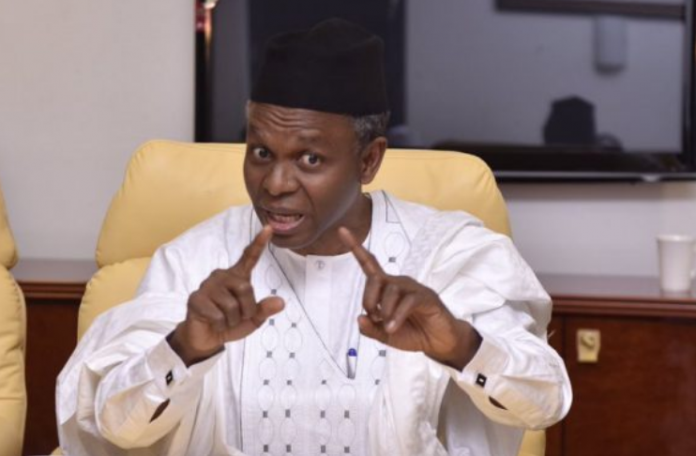The Kaduna State Government has filed a criminal complaint against Wazirin Zazzau and chairman Zazzau Kingmakers’ Committee, Ibrahim Aminu, for alleged forgery and violation of Official Secret Act during the selection process of a new emir.
The kingmaker is summoned to appear before a Chief Magistrate’s Court 1, Ibrahim Taiwo Road, on February 15.
Recall that the state government had on October 7, 2020 jettisoned the selection process of the five kingmakers and arbitrarily appointed Ahmed Bamalli as the new emir.

The succession tussle followed the death of Emir Shehu Idris on September 20, 2020, after reigning for 45 years.
While the state government had a prefered candidate in person of Mr Bamalli, the kingmakers however picked late Iyan Zazzau Bashar Aminu, who scored 3 votes, as the best choice, followed by Munir Jaafaru and Aminu Shehu Idris who scored 1 vote each.
Angered by the decision of the state government, the kingmakers’ prefered candidate filed a case at the state High Court, seeking the reversal of the decision and his declaration as the lawful successor to the throne.
Mr Aminu sought the court to declare that, “having scored the highest number of lawful votes cast by the kingmakers and thus selected by the said kingmakers, he has thus acquired vested right to the stool of the Emir of Zazzau from the date of his selection henceforth”.
But Iyan Zazzau, who was not in good terms with the state governor, Nasir El-Rufai, died on January 1, days after filing the case to challenge the state government.
The Case Against The Kingmaker
In the “Application for Criminal Direct Complaint” sighted by DAILY NIGERIAN, the state government directed the Registrar of the Chief Magistrate Court to cause a criminal case against the 74-year-old kingmaker for releasing the outcome of their decision to “unauthorized persons”.
“Please cause a criminal summons to be issued against the above named defendant [Alhaji Ibrahim Muhammad Aminu] for the offences of forgery of Public Seal, Forgery, Using as Genuine False Documents, Making or Processing Counterfeit seal with the intent to commit Forgery and Violation of Official Secret Act all under Section 346, 343, 347, 348 of the Penal Code Law of Kaduna State 2017 and under the official Secret Act in the following terms;
“The Defendant (Alhaji Ibrahim Muhammad Aminu) is the Wazirin Zazzau and the Chairman f Zazzau King Makers Committee and in such capacity had actively participated and as the chairman of the selection process of the new Emir of Zazzau held on the 24th day of September, 2020 and in that capacity released information regarding the proceedings of the selection exercise to unauthorized persons in complete violation of the Official Secret Act.
“The Defendant in his capacity as the chairman Zazzau king makers’ committee also got access to copies of letters addressed to the Commissioner for Local Government, affixed his signature on it confirming the document as a certified true copy (CTC) thereby making a false document and Forgery of a Public Seal and thereafter handed the documents to unauthorized persons,” the document read in part.
DAILY NIGERIAN gathered that the outcome of the selection was leaked to the press by some of the contenders, who sources said were entitled to know the outcome of their contest.
“Waziri did not leak or forge any document. The princes who participated in contest have rights to know the outcome. So it is not a violation of the law if actually Waziri gave the contestants the results,” said a source familiar with the development.
Legal Opinion
A lawyer, Abba Hikima, told DAILY NIGERIAN that the charges are malicious and frivolous, saying not every material information qualifies as classified information.
“The direct criminal complaints issued by the Kaduna State government against Alh. Ibrahim Mohammed Aminu is ridiculous. Before anybody could be charged for violating the Official Secret Act, there has to be a prima facie allegation of divulgence of “classified information”.
“And the law is clear that not every material information qualifies as classified information. The term has been defined by Section 9 of the Interpretation Act to mean: “any information or thing which, under any system of security classification, from time to time, in use by or by any branch of the government, is not to be disclosed to the public and of which the disclosure to the public would be prejudicial to the security of Nigeria.”
“The documents purported to have been divulged by the accused person are documents which ordinarily should have been made available to the public suo motu. If my facts are right, the Kaduna State has domesticated the Freedom of Information, 2011 the overriding objective of which is to give Nigerians access to information, records and documents held by public offices carrying out public functions.
“Courts are the custodians and interpreters of laws world over. The Nigerian Court of Appeal in 2014, in a case between Abba V Jamb & Anor., has clarified that not all government documents are actually “classified” and not all public public officers have the capacity to commit the crime of divulging classified information.
“In my opinion, therefore, the allegation is malicious and frivolous, and has made fun of the information access regime of the state,” Mr Hikima said.






